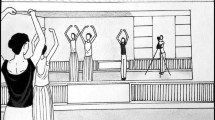Abstract
The anthropological venture may seem a linear progression from observation to elaboration of theories and writing. Having decided where to do fieldwork, anthropologists go to their chosen area, interact with men and women, collect data and formulate hypotheses. On leaving the field they go home with a variety of ‘objects’ which they transform through professional concepts, jargon and theoretical models into ethnographic texts.
Access this chapter
Tax calculation will be finalised at checkout
Purchases are for personal use only
Preview
Unable to display preview. Download preview PDF.
Similar content being viewed by others
References
Bell, D., Caplan, P. and Karim, W.J. (eds). 1993. Gendered Fields: Women, Men And Ethnography. London and New York: Routledge.
Best, D. 1992. The Rationality of Feeling: Understanding the Arts in Education. London: Falmer Press.
Best, D. 1996. Educating artistic response: understanding is feeling. JASHM: Journal for the Anthropological Study of Human Movement, 9, 1, Spring, pp. 1–14. Reprinted from Curriculum, 15, 1, 1994.
Blacking, J. 1973. How Musical is Man? Seattle: University of Washington Press.
Brigg, J. 1970. Never in Anger: Portrait of an Eskimo Family. Cambridge, Massachusetts: Harvard University Press.
Cesara, M. 1982. Reflections of a Woman Anthropologist: No Hiding Place. New York: Academic Press.
Clifford, J. 1988. The Predicament of Culture: Twentieth Century Ethnography, Literature and Art. Cambridge, Massachusetts: Harvard University Press.
Clifford, J. and Marcus, G.E. (eds). 1986. Writing Culture: the Poetics and Politics of Ethnography. Berkeley: University of California Press.
Cowan, J. 1990. Dance and the Body Politic in Northern Greece. Princeton, New Jersey: Princeton University Press.
Deren, M. 1953. Divine Horsemen: the Living Gods of Haiti. New Paltz, New York: McPherson and Co. Reprinted 1970.
Favret-Saada, J. 1977. Les mots, la mort, les sorts. Paris: Gallimard. Published in 1980 by Cambridge University Press as Deadly Words: Witchcraft in the Bocage.
Fernandez, J. 1993. A guide to the perplexed ethnographer in an age of sound bites. American Ethnologist, 20, 1, pp. 179–84.
Fox, R. 1973. Encounter with Anthropology. London: Pengu in Books.
Goodale, J. 1971. Tiwi Wives: a Study of the Women of Melville Island, North Australia. Seattle and London: University of Washington Press.
Grau, A. 1990. Interculturalisme dans les arts du spectacle. In Pidoux, J.-P. (ed.), La danse, art du XXe siècle? Lausanne: Payot, pp. 343–55.
Grau, A. 1991. John Blacking: reminiscences. Popular Music, 10, 2, pp. 221–8. Published by Cambridge University Press.
Grau, A. 1992. Intercultural research in the performing arts. Dance Research, 10, 2, pp. 3–29.
Grau, A. 1993. John Blacking and the development of dance anthropology in the United Kingdom. Dance Research Journal, 25, 2, pp. 21–31.
Grau, A. 1994. Dance as politics: dance as a tool for manipulating the social order among the Tiwi of Northern Australia. In Proceedings of the 17th symposium of the International Council for Traditional Music Study Group on Ethnochoreology. Nafplion, Greece: Peloponnesian Folklore Foundation, pp. 39–44.
Grau, A. 1995. Ritual dance and ‘modernisation’: the Tiwi example. In Dabrowska, G. and Bielawski, L. (eds), Dance, Ritual and Music: Proceedings of the 18th Symposium of the International Council for Traditional Music Study Group on Ethnochoreology, Skierniewice, 9–18 August, 1994. Warsaw: Polish Society for Ethnochoreology, Institute of Art, Polish Academy of Sciences, pp. 89–96.
Grau, A. 1996. Dance and everyday experience. Blitz 96:: The Mag. Supplement to Dance Theatre Journal, 13, 1 (Summer), pp. 41–3.
Grau, A. 1997a. Dance, South Asian dance and higher education. Choreography and Dance, 4, 2, pp. 55–62. Special issue entitled South Asian Dance: the British Experience, edited by A. Iyer, published by Harwood Academic Publishers.
Grau, A. 1997b. Dancers’ bodies as the repository of conceptualisations of the body, with special reference to the Tiwi of Northern Australia. In Rauch, I. and Carr, G.F. (eds), pp. 929–32.
Grau, A. In press. On the acquisition of knowledge: teaching kinship through the body among the Tiwi of Northern Australia. In Keck, V. (ed.), Knowing Oceania: Constituting Knowledge and Identities. Oxford: Berg Publishers.
Hastrup, K. 1987. The Challenge of the Unreal. Copenhagen: Museum Tusculanum Press.
Hurston, Z.N. 1937. Their Eyes were Watching God. Philadelphia: J.B. Lippincott. Reprinted by University of Illinois Press in 1978.
Kilani, M. 1994. L’invention de l’autre: essais sur le discours anthropologique. Lausanne. Payot, Sciences humaines.
Lunn, J. 1994. Speak up! Dance Now, 3, 1, pp. 26–7.
MacClancy, J. and McDonaugh, C. 1996. Popularizing Anthropology. London and New York: Routledge.
Marcus, G.E. and Fisher, M.J. 1986. Anthropology as Cultural Critique: an Experimental Moment in the Human Sciences. Chicago: University of Chicago Press.
Mascia-Lees, F., Sharpe, P. and Cohen, C.B. 1989. The postmodern turn in anthropology: cautions from a feminist perspective. Signs, 15, 1, pp. 7–33.
Pattie, S. 1997. Faith in History: Armenians Rebuilding Community. Washington, D.C. and London: Smithsonian Institution Press.
Rauch, I. and Carr, G.F (eds). 1977. Proceedings of the International Association for Semiotic Studies. Fifth Congress, 1994, at University of California, Berkeley. The Hague: London.
Sanjek, R. (ed.). 1990. Fieldnotes: the Making of Anthropology. Ithaca, New York: Cornell University Press.
Schultz, E. and Lavenda, R. 1990. Cultural Anthropology: a Perspective on the Human Condition. St Paul, Minnesota: West Publishing Company.
Sperber, D. 1982. Le savoir des anthropologues. Paris: Hermann, Collection Savoir.
Thomas, H. 1993. An-other voice: young women dancing and talking. In Thomas, H. (ed.), Dance, Gender and Culture. London: Macmillan, pp. 69–93.
Editor information
Editors and Affiliations
Copyright information
© 1999 Palgrave Macmillan, a division of Macmillan Publishers Limited
About this chapter
Cite this chapter
Grau, A. (1999). Fieldwork, Politics and Power. In: Buckland, T.J. (eds) Dance in the Field. Palgrave Macmillan, London. https://doi.org/10.1057/9780230375291_13
Download citation
DOI: https://doi.org/10.1057/9780230375291_13
Publisher Name: Palgrave Macmillan, London
Print ISBN: 978-1-349-40427-8
Online ISBN: 978-0-230-37529-1
eBook Packages: Palgrave Social & Cultural Studies CollectionSocial Sciences (R0)




